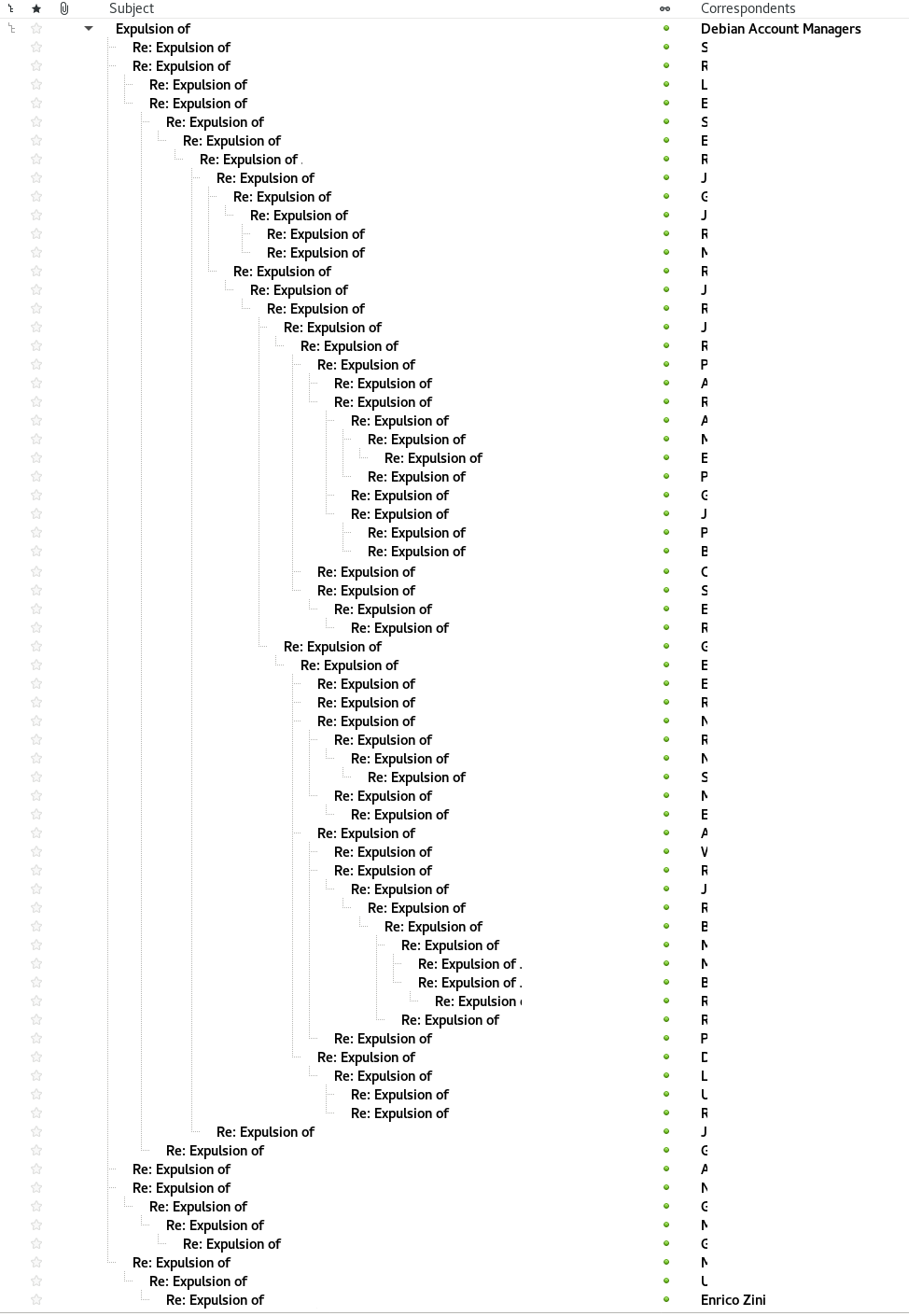Many free, open source software organizations have seen increased tension in the last few years due to cult-like phenomena. Volunteers have complained about the oppressive impact of monocultures and groupthink. The Debian Community News team is offering to mentor an intern under Outreachy or another funding program to explore this problem.
The Debian Community News team is made up of volunteers who have generously offered their time and expertise to facilitate this internship. We are also seeking an additional expert from academia or industry who can complement our competencies in this area.
Please help share this announcement on social media so we can make Debian more open and tolerant

Related articles
Your profile
- Completed at least two years of formal education in a related field such as psychology, organizational behavior, management science, cults, religion or anthropology
- Interest in technology and free culture
- If funded by Outreachy, you may need to satisfy diversity criteria. If another funding source is found, alternative criteria may be used
- Good knowledge of English
Application
Please subscribe to the Debian Project list and send a brief email with the subject Outreachy to introduce yourself. We will then send you an application task by private email.
You can click here to generate the email.
Things to include:
- Your location
- Education level
- Previous experience
- Link to your blog, social media or any relevant publications

In detail
The project will include analysis of public email records, emails leaked from debian-private, attendance at free software events and potentially interviews with some community members.
The International Cultic Studies Association has published a checklist of Characteristics Associated with Cultic Groups. Part of your task will be to evaluate the Debian organization, FSFE, FSF and other free software organizations to see how they score using this or a similar checklist.
We invite you to think carefully about each point on the checklist, for example:
- The group displays excessively zealous and unquestioning commitment to its leader and (whether he is alive or dead) regards his belief system, ideology, and practices as the Truth, as law. [Debian's leader is the DPL but for this point on the checklist, the leader could be the leader+girlfriend, as in Mollamby, or the leader could even be the cabal or some other gatekeeper in the organization]
- Questioning, doubt, and dissent are discouraged or even punished. [See the censorship of emails about going to Israel and defamation of people who question Google money]
- Mind-altering practices (such as meditation, chanting, speaking in tongues, denunciation sessions, and debilitating work routines) are used in excess and serve to suppress doubts about the group and its leader(s). [the 24x7 environment created by email lists and chat channels, lengthy email discussions denouncing people on debian-private, events with long hours held on weekends, members giving up personal vacation time to attend lengthy events]
- The leadership dictates, sometimes in great detail, how members should think, act, and feel (for example, members must get permission to date, change jobs, marry or leaders prescribe what types of clothes to wear, where to live, whether or not to have children, how to discipline children, and so forth). [See the doctrine of safe spaces and the false accusations of harassment against people who don't obey and the blackmailing of members to comply]
- The group is elitist, claiming a special, exalted status for itself, its leader(s) and members (for example, the leader is considered the Messiah, a special being, an avatar�or the group and/or the leader is on a special mission to save humanity). [See the constant fights about who is and isn't a real Debian Developer]
- The group has a polarized us-versus-them mentality, which may cause conflict with the wider society. [see comments about the point above]
- The leader is not accountable to any authorities (unlike, for example, teachers, military commanders or ministers, priests, monks, and rabbis of mainstream religious denominations). [see questions about Google money hidden and stonewalling when asked about the Mollamby affair]
- The group teaches or implies that its supposedly exalted ends justify whatever means it deems necessary. This may result in members' participating in behaviors or activities they would have considered reprehensible or unethical before joining the group (for example, lying to family or friends, or collecting money for bogus charities). [look in the leaked debian-private emails]
- The leadership induces feelings of shame and/or guilt in order to influence and/or control members. Often, this is done through peer pressure and subtle forms of persuasion. [see the way we have documented the blackmailing of Dr Norbert Preining and our earlier critique of shaming in Debian]
- Subservience to the leader or group requires members to cut ties with family and friends, and radically alter the personal goals and activities they had before joining the group.
- The group is preoccupied with bringing in new members.
- The group is preoccupied with making money. [see how Debian obfuscates revenues in a web of Trust Organizations]
- Members are expected to devote inordinate amounts of time to the group and group-related activities. [see comments above about the 24x7 culture of electronic communications, events held on weekends and the long working hours at events]
- Members are encouraged or required to live and/or socialize only with other group members.
- The most loyal members (the �true believers�) feel there can be no life outside the context of the group. They believe there is no other way to be, and often fear reprisals to themselves or others if they leave (or even consider leaving) the group.
Not every cult corresponds to every point on this checklist. Nonetheless, we feel it is a useful tool for understanding what is going wrong in organizations like Debian.
Debian lynching example
Could this be a cult?
Could you help prevent the next death of a Debian contributor?



